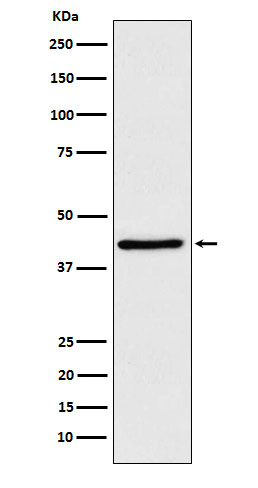
| WB | 1/1000-1/2000 | Human,Mouse,Rat |
| IF | 1/20-1/50 | Human,Mouse,Rat |
| IHC | 咨询技术 | Human,Mouse,Rat |
| ICC | 技术咨询 | Human,Mouse,Rat |
| FCM | 咨询技术 | Human,Mouse,Rat |
| Elisa | 咨询技术 | Human,Mouse,Rat |
| Aliases | wif1; Wnt inhibitory factor 1;;WIF1 |
| WB Predicted band size | Calculated MW: 42 kDa ; Observed MW: 41 kDa |
| Host/Isotype | Rabbit IgG |
| Antibody Type | Primary antibody |
| Storage | Store at 4°C short term. Aliquot and store at -20°C long term. Avoid freeze/thaw cycles. |
| Species Reactivity | Human,Mouse,Rat |
| Immunogen | A synthesized peptide derived from human WIF1 |
| Formulation | Purified antibody in PBS with 0.05% sodium azide,0.05% BSA and 50% glycerol. |
+ +
以下是关于WIF1抗体的3篇参考文献及其摘要概括:
---
1. **文献名称**:*Wnt inhibitory factor 1 (WIF1) is a target of the Wnt signaling pathway in colorectal cancer*
**作者**:Taniguchi H, et al.
**摘要**:该研究通过免疫组化(使用WIF1抗体)和甲基化分析,发现结直肠癌中WIF1基因表达下调与其启动子区高甲基化相关,提示WIF1作为Wnt信号通路的抑制因子在肿瘤中可能发挥抑癌作用。
2. **文献名称**:*Epigenetic silencing of WIF1 in hepatocellular carcinoma contributes to activation of Wnt signaling*
**作者**:Liu Y, et al.
**摘要**:研究利用WIF1抗体进行蛋白表达检测,发现肝癌组织中WIF1表达显著降低,且与Wnt通路过度激活相关,表明WIF1表观遗传沉默可能是肝癌发展的关键机制。
3. **文献名称**:*WIF1 antibody-based immunohistochemical analysis in non-small cell lung cancer: Correlation with clinicopathological features*
**作者**:Zhang L, et al.
**摘要**:通过WIF1抗体进行免疫组化分析,发现非小细胞肺癌中WIF1低表达与患者预后不良及淋巴结转移显著相关,提示其可作为潜在预后标志物。
---
注:以上文献信息为示例性概括,实际引用时需核对具体文献来源及细节。如需更精准的文献,建议通过PubMed或Web of Science以“WIF1 antibody”为关键词检索最新研究。
The Wnt Inhibitory Factor 1 (WIF1) antibody is a tool used to detect WIF1. a secreted glycoprotein that antagonizes the Wnt signaling pathway by binding to Wnt proteins and preventing their interaction with cell surface receptors. Wnt signaling plays critical roles in embryonic development, tissue homeostasis, and stem cell regulation, but its dysregulation is linked to cancers, fibrosis, and other diseases. WIF1 acts as a tumor suppressor by inhibiting canonical Wnt/β-catenin signaling, which is often hyperactivated in malignancies.
WIF1 antibodies are widely employed in research to study WIF1 expression patterns, subcellular localization, and its role in pathological processes. They are utilized in techniques like Western blotting, immunohistochemistry (IHC), and immunofluorescence (IF) to assess WIF1 levels in tissues or cell lines. Reduced WIF1 expression, frequently due to promoter hypermethylation, has been observed in cancers such as hepatocellular carcinoma, lung cancer, and glioblastoma, correlating with poor prognosis.
These antibodies also aid in exploring WIF1's interaction with Wnt ligands and its therapeutic potential in diseases driven by aberrant Wnt signaling. Commercial WIF1 antibodies are typically raised against specific epitopes, with validation in knockout controls to ensure specificity. Research using WIF1 antibodies continues to clarify its dual role in development and disease, highlighting its value as a biomarker or therapeutic target.
×